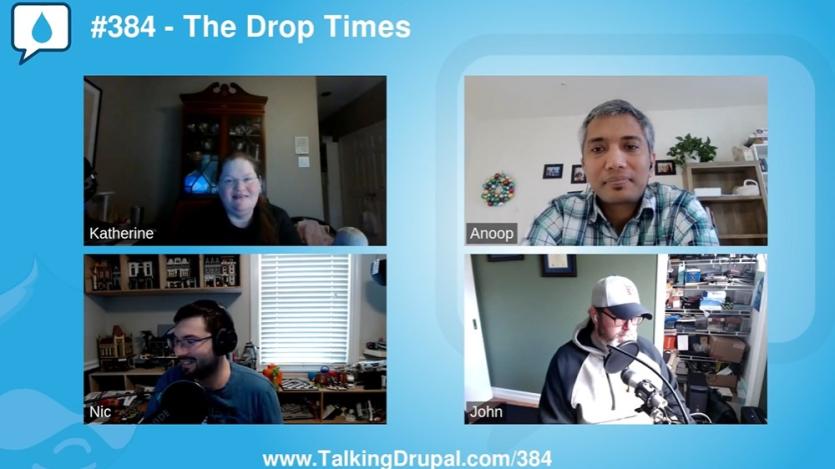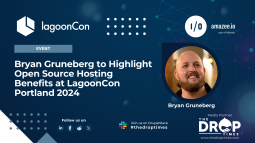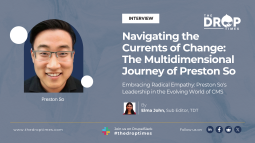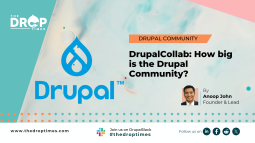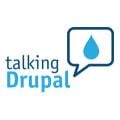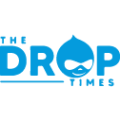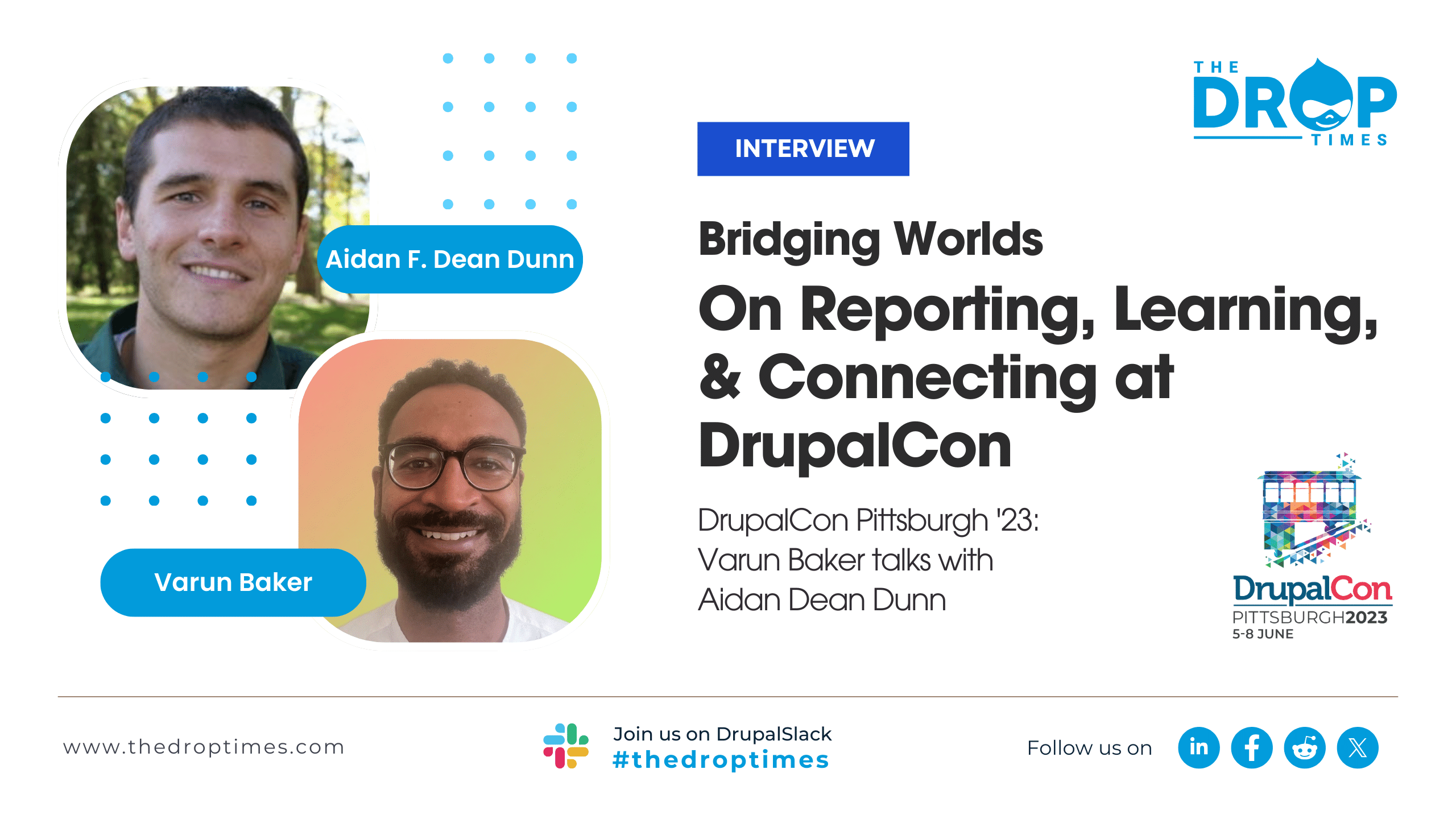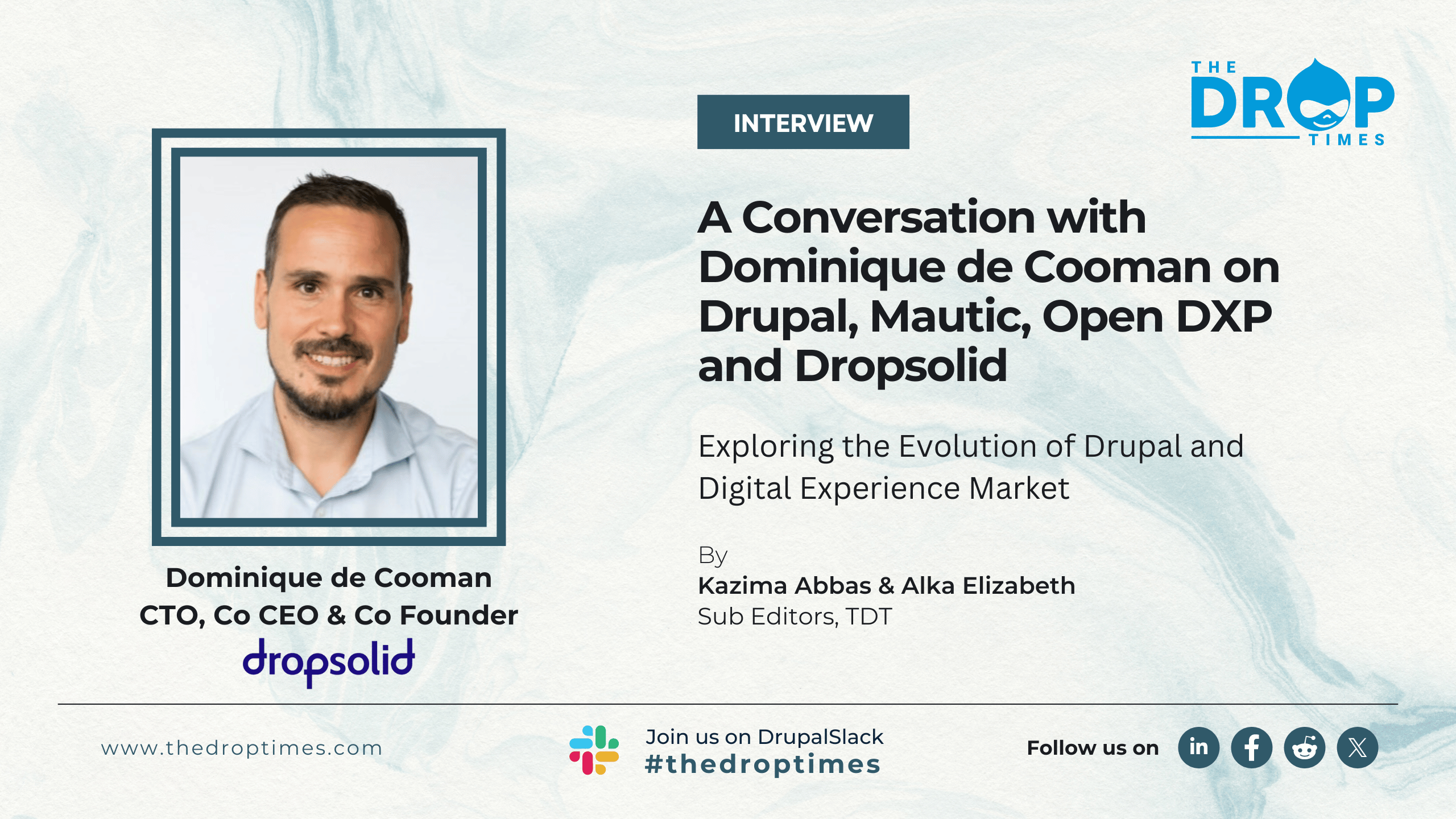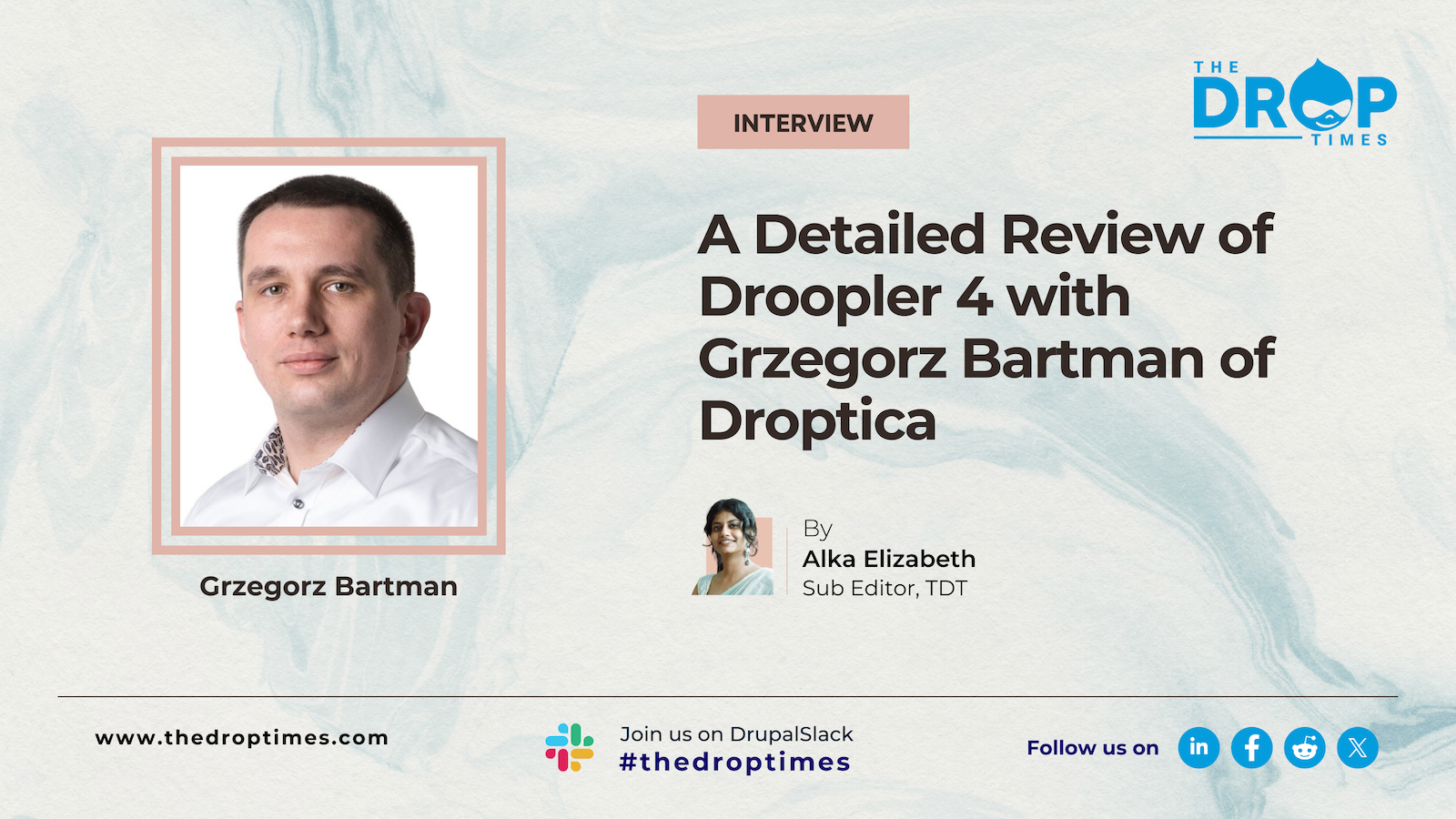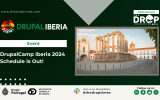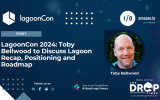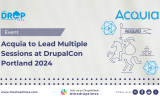Full Transcript of the Talking Drupal Podcast Featuring TheDropTimes
Nic Laflin 00:05
This is Talking Drupal, A weekly chat about website development from Drupal people has one thing in common. We love Drupal. This is episode 384. TheDropTimes. Welcome to Talking Drupal. Today we're talking about TheDropTimes with Anoop John, Anoop is the founder and CTO of Zyxware Technologies, one of the oldest Drupal firms in the world, who founded Zyxware in 2006 and has been building the Drupal and contributing to Drupal since then. Welcome to the show and thank you for joining us. Thank you. I'm Nic Laflin, founder of nLightened development and my co-host is, as usual, John Picozzi, a solution architect at EPAM.
John Picozzi 00:50
Hello, everyone. I am nice and cosy today. I'm wearing my Drupal 10 hoodie that I got from the Drupal association for creating a very creative meme. So I won a contest and the DA sent me a hoodie. So I appreciate them doing that, and it is super comfortable. So I appreciate that.
Nic Laflin 01:18
Also joining us for the next four weeks as guest host is Katherine Druckman, open source evangelist at Intel. She's the co-host of the reality 2.0 and floss weekly podcast. Katherine is also a longtime Drupal enthusiast, former Digital Director of Linux Journal, and a 15 year champion of the marvellous world of open source software. Welcome to the show, Katherine and thank you for joining us.
Katherine Druckman 01:41
Thank you. Thanks for having me. I'm really excited. It's really fun to be among Drupal people again for a little while.
Nic Laflin 01:49
And now we're going to our module of the week. Let's bring in Martin Anderson-Clutz, a Senior Solutions Engineer at Acquia, and module maintainer of a number of modules of his own. Martin, what do you have for us this week?
Martin Anderson-Clutz 02:04
This week, I thought we would talk about the content planner module which helps you to create, plan and manage content and offers a dashboard, a content calendar and a to-do list. The module was originally created in September of 2022. But there was actually a release in December of our sorry, it was originally released in September 2018. And then there was in December of last year 2022 And eight point x dash 1.0 release to make it stable and ready for Drupal 10 updated periodically actually only has 11 open issues and only one of which is a bug, which is actually pretty impressive considering it's in use currently by almost 1000 websites. The module was originally created by Lukas Fisher, who gave a talk about it at DrupalCon global. There's a link to that in the show notes. But it's actually been recently maintained by Dieter Horvat, hopefully I pronounced that correctly, Dieter. So in terms of how it works, it actually has a calendar that you can go into, you can select a date and the content type you want to create. And then once that content is saved, the content is automatically scheduled for that chosen date. The To-Do lists that it has can actually be viewed as kind of a Kanban board with lists for each state in your moderation workflow. And the customizable dashboard also allows for, you know, integrated kinds of third party widgets, including Google Analytics, so your content, you know, authors and editors can get a sense of what kind of content is popular on your website as an example. So let's open it up to chat about content planner.
Nic Laflin 03:45
Yeah, I want to say my first one of my first impressions about looking at this module page is, I feel like on some level, this is the module page, that module should expire to match. It is so clear, it has such great, you know, images to kind of outline what it does. I mean, a lot of times you look at a module, and you have a module page, and you have to dig into the readme to kind of figure out what's going on or install it and play around with it. But this shows you right on the module page, what it can do, how to install it, how to use it. It looks great. I mean, another question that I have, though, is if it says it's completely open source or free to use, is it a Drupal module only or is it integrating with some sort of service?
Martin Anderson-Clutz 04:32
So it's finally Yeah, it's fully Drupal in terms of how it works, which, as you point out, is kind of a differentiator from some other modules that purport to sort of do the same thing but actually use a third party service. In fact, the Drupal con global session from 2020 I think, actually is titled something like, you know, managing content with native Drupal. So you know, really sort of keying in on the fact that it is entirely a Drupal based solution.
John Picozzi 05:01
It's interesting because Stephen and I have a, we're both working on going to do more blogging. And this feels like this could be a good way to help somebody kind of create a content calendar and to fulfil their New Year's resolution. So we're having to blog more.
Martin Anderson-Clutz 05:27
Yeah, I used to work at an agency where, you know, there were a lot of those kinds of discussions around, you know, scheduling content and those kinds of things. And so, when I had seen that Drupalcon session was really excited about it and sort of took it to that, that content team, but they told me that they had basically just overhauled that whole blog system and basically weren't ready to kind of throw out all the work that had been done and restart on on content planner, which was, was disappointing to me, because it sounds super cool. And I've played around with it a little bit and it is pretty slick the way it works.
Nic Laflin 06:00
I also just want to give a quick shout out to Dieter, because he maintains the module that I've used recently that I open an issue on, and he was extremely responsive and collaborated with me to fix the issue. You know, very quickly, I mean, was like maybe two days from when I reported the issue until there was a fix release. So definitely, definitely appreciate that. That too.
Katherine Druckman 06:27
This is making me very nostalgic for my publishing days. I'm looking at it and thinking, wow, this is dreamy, I would have really loved this about 10 years ago.
Nic Laflin 06:37
I mean, those dashboards are good looking. And that can I know, I mean, it's
Katherine Druckman 06:42
makes me want to start up a new publication, which is maybe a foreshadowing.
John Picozzi 06:48
It just kind of gives you the ability, right not to have to use Trello. And to be able to like, just bring it out into your Drupal site. Right. So
Martin Anderson-Clutz 06:55
Well, the fact that it's automatically sort of in sync with the steps in your publishing workflow, I think is also pretty powerful. And, you know, like, makes things nice and simple to keep up to date.
Anoop John 07:05
Yeah, a lot of these models actually need a little more promotion. It definitely deserves to be used by more than 1000 sites.
Nic Laflin 07:13
Yes, right. Well, and that might be a segue into our primary topic. So Well, thank you, Martin. With that, we're going to move on to our primary topic. So as our listeners know, the hosts of the show also help organise NedCamp. Stephen Cross is also one of the Ned Camp organisers and talked with you in September, before our camp actually went on. The pre conference coverage and post conference coverage was fantastic from TheDropTimes. So we'd like to, personally thank you. But today we'd like to kind of talk a little bit more about drop times and let our listeners know about it. They haven't heard about it yet. So can you start with an easy question, I guess what is TheDropTimes
Anoop John 08:03
In short droptimes is a news website that is focused almost exclusively on Drupal news, that is news from the community, news about the contributors use about organisations in the community, and especially events that are happening in the community. The site was founded with a vision to be part of this initiative to really help celebrate Drupal, right within the community and also outside the community and use news as the medium to allow us to really tell people how exciting it is to be part of this community and build and grow Drupal and everything around Drupal, people and organisations in Drupal in the community.
John Picozzi 08:57
So Anoop, how did you get started? with Drupal? Can you give us a little bit of your background as to how you got started with Drupal and why, you know, kind of a site like this was an interesting undertaking for you.
Anoop John 09:13
Yeah, it goes a long way back. I am somebody who loves the idea of free and open source software. Growing up my tagline in my first email, right, my email signature was Be the change you wish to see in the world. So I felt that free software, the idea of free software actually allows people to be that right even in the smallest of ways, right? You use tools, you contribute to the improvement of those tools, you help other people with those tools, allow them to leverage it by discarding all the commercial activities around that right. So free software was very close to my heart as an idea. And so when I started the company I wanted to pick a platform that would allow me to contribute. It had to be a free software platform. It allowed me to contribute. I also wanted it to be a little more open than how a lot of other faiths of their communities were evolving at that point of time where it is closely controlled by some organisation, right? Whereas Drupal evolved to be something beyond that something larger than being strongly controlled by one organisation or individual. So I felt that Drupal was on technology, it was beautiful, like it was the answer to all my questions. As an ASP developer, ASP dot net developer, I had everything that I wanted to start working with when I picked I was not a PHP developer, when I started this, started the company. So I liked the technology, and then I allowed the community and how the community was operating at that point. And that was how I picked Drupal as a platform. And all these years, I have thoroughly enjoyed being part of this community and dropped MCs solely on some of the question that I've been asking myself and asking people within the community trying to see trying to see if I can contribute towards addressing some of the problems I have felt myself and potentially other people in the community are feeling or have felt.
Katherine Druckman 11:06
This is really exciting for me, by the way, because, again, I think I mentioned I'm very nostalgic about publishing and wondering, can you tell us a little bit more about who's involved in TheDropTimes? And TheDropTimes itself?
Anoop John 11:20
Yeah. So yeah, I can go deeper into the whole idea of why we started Drop Times right. So one thing, when I started the company, I started on my own, Zyxware Technologies. I started on my own, I was, still not a sales guy, I'm still not a sales and marketing guy. I'm still a hardcore tech guy. So he didn't code. But I felt that one of the biggest challenges as somebody who was trying to run the company and also contribute, right, was that the need to sustain the operations of the company will always supersede my ability to contribute. Right. And I felt that was very limiting, right, as somebody who loves to contribute. And somebody who would actually love to help people. And I am not Drupal, right, I have actively been on the ground as a Linux activist on the ground, helping people set up systems in those days when hardware was not very friendly to free software platforms. And so at that point, even then I felt that, hey, my time to do that is actually being held back because I have to also ensure that my company is surviving, right. So that, hey, there is the tie, that connection between the ability to contribute and the desire to contribute is not really, the loop is not complete in terms of the commercial ecosystems around it, right. And then I've also seen a lot of young enthusiastic volunteers who used to work with me move on with their lives, because they had to move into proprietary software companies and get out of the ecosystem. And their ability to contribute actually goes out there as soon as they go out. So I felt that hey, we should do better as a community, right, that people who are in the community should actually not feel a need to go out. So we should do, we should do much, much better as a, as an as an organised community, we should be able to organise houses better, so that we are so thriving, that people would actually want to be part of this, right? The idea of being part of the community, the idea of contributing, the idea of giving back right should really be Hey, there is no reason I shouldn't be doing that. And there's no reason for me to actually be doing that and do it with all my earnestness. Right. So that was the key driving force, and what I have not secured has now grown to maybe around 50 people long, we are no longer facing the kind of challenges we used to face. But even now, I feel that there is an opportunity to really do this better as a community, how do we organise ourselves better? So that on the ground, activist people who are running the show on the ground, right, they get way more? Secondly, can you organise way more support centrally, in organising the community activities so that the warhead on running some of those activities are much lower? One, the ability to contribute is much higher? The outcomes of the contributions are much higher, our ability to organise things as a community is much better. Can we, I mean, why can't we organise ourselves better just like any other large organisation can? Can we imagine ourselves as a large collective of 2000 companies, right? Can we imagine ourselves as love? Can we imagine ourselves as Intel right? Isn't the order the number of 100,000 people right? Can we imagine ourselves as Intel right? Can we have like dedicated teams of people who can sit and contribute who can sit and do marketing and sit and do for the community, right? Can we take Drupal to new new education institutions? Can we get education institutions to start running courses around Drupal right around web development around Drupal or using Drupal as the platform where they use which They used to teach development or the concepts of abdomen to new students. So all of these areas are really like questions that I've been trying to answer, right? Hey, can we do this better? Can we do this better? Can we make life easier for individuals as they go through this journey? Right? Can we make the community even more? thriving? Right? So one I have as an entrepreneur, I also have a very strong commercial question around it, right? If you look at the contributions that is happening within the Drupal community, and the total commercial ecosystem around through Google, right, Google is probably I don't know, maybe a $20 billion market, in terms of all the people using Drupal and all the large enterprises, all the businesses using Drupal, fortune 1000 companies, Drupal is the second most popular platform for their websites, I'm sure that itself is a few billion dollars worth of Drupal spend, that is happening. But if you look at the contributions, right, all of the contributions, excluding maybe the top largest contributor like IKEA, or the media, very few large companies, we exclude that a few large companies, right. And look at all the contributions made by every other small business, and individual contributors in Drupal, and look at the revenue that these organisations make, right? And then compare that against this $20 billion, right, we'll probably be making maybe a couple of billion dollars in revenue. So 90% of the revenue is generated by organisations that do not contribute comfort commensurate with the opportunity that they get out of Drupal, it's good for the cause for Drupal as a community, right, because we give a lot of opportunity for developers to get good paying jobs in the system. But at the same time, can we look at this slice that we contribute? Right, can we do our contributions better? Right? Can we organise ourselves much better than what we are doing currently, both on the organisation's friend and commercial front? Right? Because ultimately, all the contributions that we make as a community has to come from this $2 billion slice, right? We can't make money out of nowhere, right? It has to be generated.
John Picozzi 17:12
So it is the suit. Coming back to the question a little bit, right? Is TheDropTimes essentially a blog for your company? Or is that how it's how you're using it right now with the intention of including other community members? Or? And if so, like, who's writing for TheDropTimes right now? Is it just employees of your company?
Anoop John 17:39
Yeah. So I think I'd have to circle back from this point from tying this down, right. So I feel what I feel is that, hey, we have to do these companies say this 500 companies that really contribute or 500 companies and 2500 contributors who really contribute aggressively to Drupal, right, we have to organise ourselves better as a yield, so that instead of the $2 billion that we generate, right, we have to be doing $10 billion, right? We have so that we can magnify our contributions, five times more, or 10 times more, actually, our contributions will be magnified much higher, because the profitability of this $2 billion slice is so much lower than the $18 billion slice. So my reading is that if we organise ourselves better, we can do much better as a community in terms of the growth of the community. And so the arms. And I've been asking this question right within the community for the last maybe eight years or so ever since I went to Drupal south in 2014. I've been asking people all the way across the community, to people in leadership, people who are running other organisations, Hey, how can we do this better? How can we do this better? How can we drive our activities better? And it is a little discouraging, but I'm not discouraged. It is a little discouraging to see some of the numbers in terms of how well we are growing as a community. Right? We are sowing in terms of adult adoption. So I feel we have to address
Nic Laflin 19:06
it. So yeah, so this is something that we've talked about on the show a few times to kind of circle back a bit like we, the community thrives on contribution, right? And some of that contribution can be volunteer, but even when you're volunteering, the contribution is dependent on the fact that you have some of your needs being met elsewhere, right? If you're contributing back, you're in a space where you can have that privilege, right. So the question is, and this is, you know, the question is, how do you get a larger percentage of that contribution to be sponsored in such a way? You know, and I think we've talked about how the WordPress community does that with I think, I think it's the idea that you give 5% of 5% of your workforce 5% of your projects. 5% of your income should be going towards being contributed back to the work First community I think it I think what it is and, and like you said there's some very large companies using Drupal that are, are not contributing back to Drupal in any meaningful way. So is TheDropTimes a mouthpiece you're using to try to create that organisation is TheDropTimes the way that you're trying to organise kind of a grassroots like promotion of the Drupal community.
Anoop John 20:30
What I felt was we need to come, we need to organise ourselves better to organise ourselves better, we need to communicate this need, right better to a larger audience. And that my wider audience, and we need to have this conversation out in the country, we need to address the elephant in the room, right. And for that, I feel that people like all of us sitting here on this podcast or for the people who are passionate about the idea of the community, right, we should come together and try to try to add, ask these questions and try to answer some of these questions. So coming back to the point, John was asking earlier, right, this is not a drop wrench is not a commercial activity done by six were to address excess commercial needs, right? Because our commercial needs are nothing right compared to the commercial needs of us as a community, right? We are so small in the piece, but together, right together with all of us, we are large, right? We are a large organisation with maybe 20,000 people, we are a 20,000 people strong organisation, right? So I feel that we need to organise ourselves better than news or a communication platform, right, or a communication channel to really project all of what we're doing. help organise ourselves better, right? Say, for example, one of the things that we have started doing is to really start reaching out to events. And thanks to Netcom for being one of the first events where we were actively involved, right, to reach out to events and do all that we can do to promote the events better, right? Taking events as a mechanism to really project Hey, come to, we're doing a lot of stuff, we need more people, we need more people to get involved. We need to work together better right here. And that is one thing. And the second part I feel is there's a lot of waste in how we do things. I've run a lot of on the ground events, like running events, there's so much order, right, right, trying to run an event and a lot of these things can actually be centrally managed. Why? Why do I have to market my own event? Right? Can we have a pool of people sitting together and doing a lot more digitally powered marketing activities around our events? Right? Can we use drupal dot or RG better for marketing our events? Right? Can we broadcast to a much larger number of people to attend our digital events, right. So there's a lot more that we can do better. So one part of that is something that we've felt, hey, we can put together this initiative to start projecting these things out into the open, right start touching more people right within the community. I'm not a big fan of preaching to the choir. But preaching to the choir is essential for us to organise it. But at the same time, we should also grow the community, because the average age of Drupal developers has been constantly increasing, much faster than the average of other technologies out there. And there are also more hotter technologies for newer generations to embrace. So I think there has to be a bit more of an active initiative to reach out. And I felt that what's a good medium, and projecting our initiatives, our successes, our excitement, our activities, our celebrations, our individuals right into the wider audience out there is also an essential part of that as part of growing the Drupal community. So problems are just an attempt to address some of these things. Now, I do not have answers to all the questions on how it is going to evolve, or I know that it cannot sustain on its own as it stands, right? I mean, putting in all the money around what is essential for that. And it's also so small, right compared to what it can really get to. So figuring out answers is I would want much more input and collaboration with the community individuals out there people who are into this, to take it forward to the next level. And also to address some of the questions. I have documented a lot of these conversations slash questions into a presentation, which I have shared with the team earlier. And this has been built over the last several years, I don't know maybe four or five years. And so a lot of people have interacted on that percentage.
Nic Laflin 24:20
Yeah. So if, if you were to boil down the mission statement at TheDropTimes into one sentence, what would that be? What's the mission statement?
Anoop John 24:30
It will promote Drupal, and everything around Drupal and celebrate Drupal.
Katherine Druckman 24:37
Okay, perfect. Okay. So I think we kind of hinted at it a little a little bit ago, but I don't know that we got a clear answer, where do you get the content? How do you source content for times? Yeah,
Anoop John 24:52
interesting question. So we are a small team, like a small team of journalists that we have put together for this and They are really all of them based out of India. And none of this news is like new news unless it is like an active interview that we conduct with an individual or directly working with a person to understand what they're going to do with the new module or something like that, right? All of this content is ultimately generated and published in one of these organisations, or even websites, or individual blogs or aggregated news websites out there, right? And, and this is primarily aggregating, aggregating that information, and some of it has to be rewritten, a lot of it is primarily taking that information and writing it in your own words onto the website. And, that is how it is currently happening. And the volume is still super small, I'm not happy with the coverage, right? I want 100 times this news coverage, I want everything in the community to be covered, I want coverage of every small access of every user on the right, I want all initiatives taken up by the community in all small forms or large forms to be covered. But that's a huge effort, right? We can't scale it like that. So it has to be I we need to figure out how to scale it in terms of collaborating, bringing content to the table. But at the moment, it is super small. And I would love to see it 100 times larger than it is.
John Picozzi 26:24
I mean, the idea. Sorry, I like the idea of like, kind of repurposing some of the content, just looking at like a small small segment of this. Right. So like what TheDropTimes did for NedCamp, right? And I say repurpose, right. But there were interviews that happened there to interview, you know, organisers, speakers, so on so forth. But it was, you know, in an effort to better promote the camp, but also provide more insight into, you know, why these people are doing what they do? You know, I think that the idea of taking camp content and like elaborating on it is, is super interesting, and really a great form, or a great way to to get content for something like this. And I think I'm about to ask the question that Nick, Nick was getting good at getting to, but maybe not. I'm just curious. How many readers and users do you guys currently reach? You said you were you know, you're trying to reach more obviously, but like, what do you what are you guys getting to right now?
Anoop John 27:35
We're getting around 10,000 pageviews a month at the moment. But super small, right? It's nothing. But we want it to be larger? If you look at sudo apt search on Drupal on LinkedIn, right? We get I think around 200,000 nodes less than that, around that number as the number of results. And if you look for a Drupal developer, I think the numbers are much smaller. If you look at the contributions that we don't do one to two hours, right, I think we had around 8000 people committing last year, I think that that is a number. So our audience, my sense of our audience is that we have a potential target audience as it stands of around 200,000 people. And maybe 200,000 100,000 to 200,000 pageviews a month is what we can potentially hit. But more than the pageviews, our ability to actually be a touch point, right? So some of the initiatives currently happening, I have no idea what is happening, I reached out to a specific initiative to collect news around that initiative. And I asked Hey, is there someplace I can actually look and read on what is happening, right? There's nothing right? So we need to do a much better job. I mean, we are interested because we are interested, but there are a lot more people who can be interested if you can let them know that this is what we are doing. Right? Why do we want to do this? I mean I think we have to be way more aggressive than that and the way we interact with each other as a communicator, I sometimes feel sad, hey, some of these people are trying to promote stuff. And I'm going to people like, like, three people, like five people, like come on, like that beat not mine, but somebody assisted, right. He's doing some fun stuff like that. So we should do a much better job on doing this. I think we're all developers like, I don't think
John Picozzi 29:21
definitely, like, it's definitely an area where like,camps specific, right have that kind of problem. Well, most camps had that problem, right? Where it's like they have great content, but they're so focused on putting on a good event that like the marketing and promotion piece of it kind of happens. Ad hoc, right. It's not. It's not often a guided effort. So you know, I think having a place where people can, you know, can reach out to you or reach out to somebody on your team and say, Hey, I have this event. Here's like, where we're where our sessions are Like, how can you guys help? Is, is definitely interesting.
Anoop John 30:04
Yeah, I think, I think one of the reasons is we are all developers like Drupal. Drupal evolved as a hardcore tech platform, right? So the kind of people that revolve around Drupal is also hardcore tech, which means that, hey, I'm not really a marketing sales marketing guy. I haven't seen that
John Picozzi 30:19
necessarily true. I have a DrupalCon talk from last year that talks all about non code contributions. So, you know, I think there are probably more more marketing and folks in the Drupal community than maybe we're aware of, but I think, I think just just the fact of like, when you're a camp organiser, you know, speaking, speaking from experience, right, it's, it's like thinking about marketing the campus is maybe not the last thing, but like one of the one of the one of the last things that you're thinking about, because you're worried about a venue, you're worried about, you know, 6 million other things to make sure the campus is successful. So yeah
Nic Laflin 31:05
part of it, too, is getting that information out there. And that's why we've talked about not we've, we've made it a point to talk about a contribution so much, because having a project manager or marketer or graphic designer, contributing back to the community is just as valuable as having a coder contribute to it, especially at this stage. But I think the way that a lot of marketing people think about it is for graphic designers, and I could be wrong, but I think that they don't think that the community values that. And Drupal, the Drupal community, certainly does. And, you know, the way that we provide credit to people for things I think is starting to show that people are starting to notice that right. But you know, having a mouthpiece having another way to communicate to those people like we would value your contribution, your contribution here would help the community just as much as somebody running some lines of code. You know, one of the big ones recently that comes to mind is the easy out of the box initiative, there's the Project Browser initiative, right. But there's like a sub initiative of that they're trying to get a really nice clean logo for all the top 100 modules, because it just makes that project browser page look so much nicer. I don't have the talent or skills that are required to make a nice look. And I don't even have to tell you just because it takes to make a bad looking logo. Nevermind a nice looking logo for something like the token module, right? Or views or something that's somewhat abstract, right? All of us won't be part of Project Browser, because it's part of core but, but like having another mouthpiece like that is great.
John Picozzi 32:44
I think one other aspect there, Nick, that I, you kind of highlighted for me, or maybe magnified for me too, is the fact that like, for a lot of camps, like there are camps happening all across the country. Right and, and, and world. That's true. You know, it's a global global community. Definitely. Right. But like, a lot of times, it's, it's also for those camps, it's like shouting out into the ether or shouting out into, like, a sea full of fish. Right. And one thing that, you know, I think TheDropTimes, and the weekly drop, and some of these other publications do is they're they're they're a platform to focus some of those things, right. So to give some of those events like, like, almost a great equaliser, right to be able to equalise like, hey, this camp, that's not as, you know, not as not as prolific or not, as not, as well, you know, marketed as this other camp now can get on this platform and have the same sort of coverage. And people can be more more aware
Nic Laflin 33:51
of it. And you're being more proactive about it, too, right? Yeah. You're rather rather than the organisers having to be like, oh, I need to notify the weekly drop and notify the like, one of the things that notice with TheDropTimes is, you know, you found our content, which brings me to, you know, any any initiative or project will have its growing pains. And I know, early on drop times, there was some concern about how attribution was working. You know, what were those issues like? And how did you overcome that? How did you kind of resolve some of the attribution concerns?
Anoop John 34:30
So I don't know if you have fully overcome that the team is the journalists that we have put together for the team, right? These are not free software contributors. So people come from the free software background, and they're only mandate is to collect, compile and publish and the numbers the end the numbers that they have to start going after, right. So one of the challenges that we had to, we had internally initially was to be able to even know how exactly this is compiled versus source from how is information about We have put together some control systems on top of that, we will also still want to depend on the community, Hey, this looks like this is from the slight edits not attribute. And it's perfectly fine. I think it should be pointed out whenever we make mistakes. And we would. And we have received a lot of guidance on this process. I've had some really good conversations on addressing some of these challenges. It's all part of the growing pain. And I think we are evolving in association, we are doing a much better job on that revision front. Now, we also tried to put in some technology support to the act of the process of attributions. So it's getting there, I don't know whether it's already. I don't know whether it's addressed completely, but I know that it is moving forward. And this has been clearly communicated to people and people appreciate the fact that yeah, we are putting some effort on this not to. I am saying internally to the people, and they are also learning and, and free software is new to these people. So I think they will, we will get there. But people also move right. So when new, new people come onto the team there will be some issues for some time and that resource, but generally, we are moving in this direction. And we want, I mean, ultimately, we are not about taking any credit for ourselves, right? We are trying to project everybody in the community, we are just trying to bring it to the table as in one, one platform, right. And we're not claiming this, our idea is to just create uniqueness is not the value that we bring to the point that we are bringing it to the table, aggregating it, organising it, projecting it, magnifying it, amplifying it, and then getting new people to see this, right. So that is a value. So I'm not too worried about the fact that, hey, we are not generating a lot of duplicate content. And initially, I was actually of the opinion that we shouldn't be doing a lot of unique content, because that will hit our ability to get those volumes, the coverage, the breadth of I mean, even to cover all the initiatives, right? Look at all the effort that is happening, all the initiative, there's so much more that we have to cover. So I want to get there. But yes, to address that question. We have seen significant improvement on that front. And I think we, if any omissions are seen, please feel free to reach out to any of us. And we'll be happy to.
John Picozzi 37:18
Yeah, I mean, I think that the first step right is to be to, as you said , to be open for people to point out like, hey, this isn't this isn't right, can you can you fix it? Right? And, you know, I think that's a great, great value. As far as TheDropTimes, right, so there you guys are kinda like the, you know, air quotes New Kids on the Block, not not to, not to be confused with the, you know, the 80s band, or maybe it was later or earlier. I apologise if I'm, if I'm butchering that reference, pop culture reference. But the question here is like being new to the new kind of Drupal publishing space, right? Do you guys feel like you've been embraced by the community? And like, what is that journey? How has that journey been? Like? How did you just kind of like, you know, get on the scene and kind of get noticed.
Anoop John 38:16
So we have been up and running for almost I think any year now and only very recently have we started reaching out to camps right to where we were, we felt, hey, we have the muscle to now start doing small. The camps have embraced us wholeheartedly. And we have partnered with all the camps since the bad camp. I don't think we did a good coverage of a bad cabinet camp, I felt we did a good job. There is a Florida double cam that we have partnered with New Jersey to boot camp, mid camp, nerd Summit, we are still in discussion. So all the camps in the US all the way to April, we are partnered or in the process of partnering. And our objective is to really cover 100% of events. I mean, there's no excuse to not cover a Drupal event. So we have to do that. And our community has the event organisers for sure have expressed their appreciation for what we're doing. And we have also received feedback from the community as well in terms of the coverage and what we're bringing to the table. In terms of the community as a whole. I do not know, because we have only started reaching out, we have only reached out to a very small fraction of the community. I would definitely like all of us to be more active in the idea of promoting Drupal, not just drop time, right, all of our initiatives, I think we should be more aggressive on social media as a community to take and interact and share all the content that we create across all the different platforms and organisations and initiatives right and project it so that not for commercial outcome. There's no commercial outcome in any of these things. So that If we can take the news out to the next generation of developers who can become part of the community, right, next set the next generation of contributors who can become part of the community to inspire another person to contribute, right? Hey, I didn't know I could do that. Right. So I think we should be much more aggressive than that. And I am hoping programs will be able to play a stronger role in that activity alone by taking it out to a new set of contributors and developers.
Katherine Druckman 40:30
So I'm curious about funding. I'm always curious about funding, frankly. But especially with something like this, that's new. I'm wondering, you know, what is your current funding model? How are you funding your current activity, but also, about, I'm wondering about your future plans, you sound like you have a lot of ambitious plans for the future. I'm wondering, you know, what those are and how your funding model might adjust to support?
Anoop John 40:55
Yeah, that's an interesting question. So news in itself is not a viable model for any kind of commercial activity, even commercial news or messages to be. Yeah, it used to be correct. It used to be. So even commercial news organisations have struggled. Right? So I don't know whether I don't know, I don't know whether there are any actual commercial models around news assets. I see news as powerful because of the role it can play in shaping and growing the community. Now, how this can be funded is still something that we are yet to figure out at the moment, when it is, by six were through whatever commercial activities that we are running as a commercial organisation. Scaling is still super small. I mean, for me, I like to think of scale, square, a small organisation. And I like to think about scale, right? So scaling is a complex problem, I don't think we have the financial ability or resources as it stands to scale to that level where I want it to, I want it to be, but I don't see drop times as the piece that is expected to scale, right, I'm looking for a much larger, collective initiative effort from across the community, with multiple people at the, at the commercial side of the ecosystem, right? To be able to drive and scale a set of activities not just dropped and right, but a set of initiatives. But one of the next things that I want to do as part of programs is to assemble a team of people who can dedicatedly sit and support the camps. Right, the back office for our Drupal camps. But that is a much more expensive proposition than just running dropped, right. But I want to get there, I want to do that. And I was part of that camp organising team for like, two years. I mean, I was hyped, barely put any effort in the right way. But I've seen the kind of effort that goes behind the scenes. It's unbelievable, right? I wonder why now, how are the people taking care of their families while they're doing this? They're like, organising, organising, organising, I don't know how much effort that goes into one camera, maybe eight people do this, all the way. So I really want a little more support for that. And that is one of the next things. So I don't know how I'm going to organise my finances . I have some thoughts. But I don't have exact answers. I didn't want to sit and keep thinking about having been thinking about this for eight years. I will Hey, hold on.
Nic Laflin 43:27
As an organiser that is ambitious, as an organiser, I would appreciate that so much, especially if it's on I think John could have pointed out to the biggest gap that we have. Or the biggest struggle we have is almost always marketing. Like yeah, even just like getting the tweets out getting the you know, LinkedIn messages though getting like getting that stuff like we it's a lot of work. But that's the position that I think we find hardest to fill. Yeah.
Katherine Druckman 43:58
There's also a struggle I think in Drupal in event marketing and just the Drupal and Drupal community as a whole. Drupal people are great at talking to each other, like we are so good at that here we are, but we struggle to reach non Drupal but we struggled to reach the external audience the the greater open source community, the the you know, the the people who would become your clients, you know, the the greater technology community, the business community, all of those things. We think we really struggle with that. So it's a challenge.
Anoop John 44:31
Outline, that document that I shared, right, some of the thoughts that I've shared are also outlined in that presentation. So the open you can we can log you can access it and comment on it and a lot of people have found it so I would love to have this conversation taken beyond the podcast or beyond conversations between industries right out take it out in the open dissect it and start addressing pieces and do proof of consecrate rock time for me is a proof of concept. And yeah, get to put together pieces that we can as part of an A lot also happen is not like nothing is happening. Okay, I'm not saying that nothing is happening, I'm a lot of initiatives are happening, a lot of experimentation is happening. Google association is actually looking to drive a lot more stuff. I think they are very aggressive, given the way they are hiring people at the moment. So I think there's gonna be a lot of interesting stuff in the community and I'm happy to be part of this journey at this point. I don't know, I don't have answers to all, how in the world am I going to find it? All answers, but yes, it's moving.
John Picozzi 45:27
So one thing I want to touch on before we move ahead, right, is you just used a developer centric term of proof of concept, right? Typically, a proof of concept is something that you do and then in most cases, you know, throw away or in some cases you build on. Right? It seems like you're very much in the, in the mindset of, of building on it, right, as opposed to, as opposed to, you know, throwing it away. So can you obviously, first of all confirm that but like, you know, I would hate to see like, you get so much, you know, so much traction and be able to grow this thing. And then for it to just kind of like go away at some point. Right? So that's not like, that's not a thought or, or on the roadmap, right?
Anoop John 46:23
Yeah, so what next? Right? So what next for me, I think what should happen next, is to really start building the idea of how do we help? How do we, how do we grow? If you don't grow? We're shrinking, right? If you're not growing, you're shrinking? How do we grow the community? How do we address the 10 percentage 90 percentage slice problem that I mentioned earlier? Right? How do we organise ourselves better as a community to try contributions better invite new developers into the community better dry, more contributions better? And drop them? I only see droplets as a part of that answer, right? It's only a part of. So other pieces that we'll have to organise, to move towards that. And I really want to start experimenting around those areas as well. So organising the team of people for Google can be slow, not really a news activity, right? It's actually organising beyond us, right. But we can use dropdowns as a platform to organise people's finances, or something like that. But I want to drop the tanks so I want to say I wonder whether it's all going to succeed or not. But that is the direction that I want to see it move forward in terms of organising things at scale, bringing together people as a key right and, and be clear about that, right? It has to be very democratic, it has to be out in the open, transparent, I've been out in the free software community for, I don't know, 20 years now, right? So I have to, you have to, you have to, it has to be no binaries. It cannot be my baby, I keep saying this, it cannot be my baby, my baby. Nobody cares about my wife. It has to be our baby, if you want it to succeed. It has to be our baby, not the idea of drop times. But the idea of the scale and how drop times evolves and becomes part of something larger, something like a collective initiative by organisations and individuals in the community. Right. I do not have answers. I have a lot of questions. I have a lot of thoughts and comments. I'm happy to engage, interact, and negotiate debates on that front, but I really don't have a clear, but I'm very clear that it has to be collective sludge, it has to be open and transparent. It has to be out in the public.
Nic Laflin 48:36
So to that end, did you consider having TheDropTimes be nonprofit? Or is it just kind of a you know, subsidiary of six, where at the moment
Anoop John 48:50
I look at Brooklands as something other than six. So as it stands, it is only a project but in terms of not for profit, it is already a not
Katherine Druckman 49:04
not a profitable and nonprofit organisation. But
Anoop John 49:13
it is not an organisation as it stands. It's not Yeah, and it's not an organisation as it is right it is still only a project, the structure, how it is going to fit where it is going to fit all of that has to evolve. If I see any commercial activity that comes right, I see it as a collective. I want to look at all of what I am trying to put effort towards outside of six right as a larger collective activity. When I say collective, I'm actually talking about a collective right where we are talking about automation and we are all business owners, right. I'm the founder and CTO of my company Zyxware Technologies and I like to be that right to be able to control and manage and operate that commercially and profitably but outside of that I'm also have reserved Somebody who's passionate about Free Software, every software activist, I would call myself and, and be able to contribute on that front, right and be able to contribute to that journey that I'm sure a lot of others are also going towards. So yes, it could become part of something larger. Something that is more managed or organised centrally by not one individual, but multiple individuals and multiple leaders and collectively by and democratically.
Katherine Druckman 50:29
So that's probably a good segue. Speaking of open source communities, free software communities, do you encourage slash allow community, the community to contribute content? And?
Anoop John 50:44
Yes, we do. There is there is a
Katherine Druckman 50:49
question, how do they do that?
Anoop John 50:52
Yeah, there's already a contributed news form on the website. But I don't think we have actually received anything via that form. People have reached out to us with news and information and requests to cover something. But that is already happening. And this one, we have put this form together for people to start using, I don't think it has gotten a lot of traction yet. But that will, I'm hoping it will happen. I mean, once we see value being generated, right, people will start contributing to it said,
John Picozzi 51:23
All 10 of our listeners are gonna go fill that form out.
Anoop John 51:26
I mean, what do you even do is write talking Drupal and weekly drop write amazing stuff. I mean, consistency and persistency. Right. I mean, no matter how small we are, it could be just one listener. It doesn't matter. At some point it is going to take off and it is going. I mean, this is the only established podcast that has been going on for so long. Right there is also adding duple ECUs podcast. I love what he's doing on the podcast. We are covering podcasts on the on drop 10s. We are listing out the podcast there as well. It's so
John Picozzi 51:58
DrupalEasy. I'm not familiar with that one. Getting getting my kidding
Nic Laflin 52:06
on the show a few times. Actually, I did notice that you were pulling in our RSS feed a couple weeks ago. I appreciate that. You know, getting our podcasts out there. Yeah.
Anoop John 52:16
Yeah. Appreciate everything we do. We have to take it out and take it to more people.
John Picozzi 52:22
Oh, that drupalEasy. I see. Okay, got it.
Nic Laflin 52:26
So, before I ask the next question. I do have a question about journalists. You mentioned you had some journalists? How many people are working on the site right now? Or working on TheDropTimes right now? And is it their full time job? Or is it just kind of? So we have
Anoop John 52:45
I think two, there is a chief editor Sebin Jacob, he comes from, he used to be a bureau chief of an actual print newspaper. And there are a couple of full time they enlist on the project. And there is also an intern who is working on the brand that multiple people have come in and gone out as well, in the short time
Nic Laflin 53:12
So a couple of Journalists?
Anoop John 53:16
And they stay in India at the moment. And I'm looking to get a bit more support from a few more interns. If I have to organise that marketing team idea, right? For the camp. So that is an extreme that I'm trying to organise. And then we have a development team who is actively involved in setting it up. We're also trying to bring jobs, Drupal jobs, aggregate that and bring to the table. We have not really been quite effective in doing that yet, but it has started happening. So there is some development activity also happening
Nic Laflin 53:53
You are talking about how news organisations in general struggle, local local news, papers and things too. But the one area, or the few areas that they are successful in, are classifieds and jobs, right? You know, because people are always looking at those. So you've mentioned a couple of times, too, that you want TheDropTimes to be more of a kind of a community initiative that you're spearheading. You want people to get involved. If somebody did want to get involved with TheDropTimes? What would be the best way to do that? Like, is it helping submit articles writing? Is it or can people help with the development? You know, what's, what's the best way people can help out right now?
Anoop John 54:38
Yeah, I think promoting and sharing is one big way we can get some help from the community, promoting and sharing the content following us on our social media channels, LinkedIn and Twitter. And I'll share those links as well. And then contributing content we would love to get content but I mean even content, the news even getting news too. All right, getting, having people go out and find news isn't actually a very labour intensive activity. If we can get news delivered to us right, we can rephrase or rehash it and publish it. So even getting it in even unpublishable form is fine. If we can get news delivered to us we can publish a broadcast so getting help getting help on promoting sharing on social media channels one contributing content we would love to get that but it's a tougher ask. But sharing is sharing followings a very easy thing that people can do to help us
John Picozzi 55:34
I just had a vision of oddly enough like spider man right because he was like, he was like a staff photographer for the Daily Planet. I just imagine you guys having a bunch of like, staff, journalists type like news people sending you sending you stuff. For the daily drop. Sorry, TheDropTimes, I just totally merged those two things together, wow. In my head. So as we bring the show to a close here and up. Is there anything else you'd like to share with our listeners any other points that we may not have or may not have covered?
Anoop John 56:24
Not much I think we have covered across the board, I love to talk to people who are passionate about the problem that I've shared in the presentation. So people who are active who are keen on contributing, working on putting in effort and sustained effort over a long period of time without any results. That would be the kind of person that you would like to go after. Like I would love to talk to people who are excited about the possibility of putting in effort towards something like this at scale.
Nic Laflin 56:55
Yeah, and for our listeners, we will have the link to that presentation in the show notes. So if it's something you're interested in, it's a lot of you know a lot about the contribution, you know, the community contributions and stuff. So it's worth looking through. And like you said, a ton of people have contributed to the project and contribution and community. So check our show notes for a link to that. Okay, well Anoop, thank you for joining us and talking to us about drop times. It's been a pleasure having you here.
Anoop John 57:31
Thank you for the opportunity to share this with all of you and hopefully to be the larger Drupal community out there.
John Picozzi 57:39
Do you have questions or feedback? Reach out to talk in Drupal on Twitter with the handle talking Drupal or by email with a show at talking drupal.com You can connect with our hosts and other listeners on Drupal slack in the talking Drupal channel.
Nic Laflin 57:54
You can promote your Drupal community event and talk to people to learn more about that at talking drupal.com/tt promo. And as you guys know listening to today, you can also vote on TheDropTimes. So just head on over there if you have an event as well.
John Picozzi 58:10
Get the talking Drupal newsletter for show news, upcoming Drupal camps, local meetups and much more sign up for the newsletter at talking drupal.com/newsletter
Nic Laflin 58:20
And thank YOU patrons for supporting talking to your boy. Your support is greatly appreciated. You can learn more about becoming a patron at talking jobu.com and choose to become a patron. Okay, we've now reached the end of the show. So Anoop if our listeners wanted to get in touch with you what's the best way for them to do that?
Anoop John 58:38
LinkedIn my LinkedIn account probably the best way to reach out to me
Nic Laflin 58:43
and Katherine, how about you?
Katherine Druckman 58:46
Oh gosh, there's so many places to find me. Where do I start? You can find me well start small plug open.intel.com and seem to be open at Intel dot pod bean.com And you can find me on Mastodon that is Katherine Druckman at libram dot one or you can find me still on Twitter as Katherine Druckman or you could probably also find me on LinkedIn
John Picozzi 59:16
you can find me on all the major social networks and drupal.org at John Picozzi and you can find out more about EPAM at epa m.com.
Nic Laflin 59:25
And you can find me pretty much everywhere at Nick's fan NICXVAN I did recreate my Twitter account just to make sure that somebody didn't take it but I really intend on using it too much in the future so feel free to follow me if you want I deleted it long enough that lost all my followers but i don't i don't really intend on using it too much.
Katherine Druckman 59:47
I actually cross post from Mastodon I just posted on Mastodon and it ends up there. Sometimes I reply still on Twitter because there's just enough going on. I don't know that this could be a whole nother whole other episode honestly Yeah.
John Picozzi 59:59
I threatened to get Nic's Twitter account and in that, that possibility scared him into just recreating.
Nic Laflin 1:00:08
But by the way, it was a huge hassle to recreate it. I had to like something on their internal side that is not working on the authentication. I had to create it eight times before it was successful. Oh, wow, it was two different browsers. I'd authenticate two different phone numbers in two different email addresses. Before I could recreate it, so was that. Yeah, without much effort. Somebody probably was it kind of but my goodness, it was way harder to create than it should have been.
Katherine Druckman 1:00:43
That's interesting. That's good information. I think locking is probably better like I get people wanting to just burn it down, you know, close their account. Go away. I get that but I think locking is probably better.
John Picozzi 1:00:55
Yeah, and as always, if you've enjoyed listening, we've enjoyed talking. Bye, everyone.
Related Event Sessions
Disclaimer: The information provided about the interviewee has been gathered from publicly available resources. The responsibility for the responses shared in the interview solely rests with the featured individual.
Note: The vision of this web portal is to help promote news and stories around the Drupal community and promote and celebrate the people and organizations in the community. We strive to create and distribute our content based on these content policy. If you see any omission/variation on this please let us know in the comments below and we will try to address the issue as best we can.



